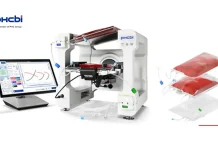Netafim, the global leader of sustainable precision irrigation solutions and agricultural projects, announced the results of a Life Cycle Analysis (LCA) study showing that corn grown using drip irrigation creates the least environmental impact and optimal land use when compared to flood and sprinkler irrigation methods.
One of the world’s most productive grains, corn is the third largest plant-based food source in the world, with 1.2 billion metric tonnes produced in the last year. The most important crop in the US, corn is also cultivated in China, South America, India, Ukraine and across Europe, grown extensively as food for both humans and livestock, as a biofuel and as a crude material for industrial purposes.
The results of Netafim‘s corn LCA, conducted by EcoChain during 2020, show that drip irrigation is a much more advanced offering than flood or sprinkler irrigation in terms of minimizing negative environmental impact and optimizing yield.
– Corn grown with drip irrigation releases 53 percent fewer carbon emissions when compared to flood-irrigated corn and 39 percent fewer carbon emissions when compared to sprinkler irrigation
– Drip-irrigated corn requires 24 percent less fertilizer than when it is grown with flood irrigation, and nearly 17 percent less fertilizer that is used to grow corn with sprinklers
– Drip-irrigated corn produces 45 percent more per kg per hectare when compared to flood, and 23 percent more when compared to sprinklers
In addition to corn, Netafim has also proven that rice grown using its drip irrigation technology out-produces conventional paddy rice farming, uses 70 percent less water, and diminishes methane emissions to almost zero.
“We’ve been showing the world how to grow more with less for nearly sixty years and our pioneering technology is now critical to mitigate the impacts of climate change,” says John Farner, Global Chief Sustainability Officer, Netafim. “Today, farmers are not only challenged by record-high energy and fertilizer costs, but also increased pressure to reduce their overall environmental footprint, all while producing our global food supply. Adoption of precision irrigation for corn, along with other crops around the world, is critical to stabilize farmer livelihoods, reduce the carbon footprint of farming, and ensure a food-secure future.”






